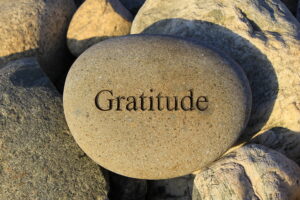The Benefits of Being Grateful
Wow! Thanksgiving is already here. How did that happen so fast? For most of us, this means a few days off from work, time with family, eating ‘til you’re stuffed, and watching football. It also marks the beginning of the Christmas season (unless you work in retail, where Christmas starts in October).
I’ve always found it ironic that we take time to spend a day being thankful for what we have, then we spend the next day, weeks, and month shopping like crazy to buy more stuff. The ten busiest shopping days of the year fall between Black Friday and New Year’s.
What’s also intriguing to me is how much more stuff we all seem to accumulate every year. The average American home contains more than 300,000 items. The average size of the American home has tripled since 1950. And the average 10-year-old owns 238 toys, but only plays with about 12 of them regularly.

I’m just as guilty as anyone when it comes to the amount of stuff I’ve accumulated in my lifetime, or even how much I can accumulate in a year. Even though I’m constantly purging my house of things I don’t need, I always seem have too much stuff. And all that stuff keeps me from knowing where the stuff I really need is. The average American will spend up to 153 days of their life searching for misplaced items.
As Thanksgiving approaches, I think it’s important to take time from our busy schedules to truly be thankful for what we have. Don’t just be thankful for five minutes before you dive into the turkey and pumpkin pie: take time to spend all week or maybe even the rest of the year being thankful.
As Americans, we have more to be thankful for than just about anyone. We live in a country where we truly have the freedom to do just about anything we want to do with our lives.
The American dream is still alive. But so many of us have forgotten what the dream is. The Oxford English Dictionary defines the American dream as the “idea that every citizen of the United States should have an equal opportunity to achieve success and prosperity through hard work, determination, and initiative.”
The dream is still achievable if we keep it in perspective. Our concept of success and prosperity should have very little do with how big our house is, what kind of car we drive, or the fact that we have five TVs, a cellphone, a laptop, and an iPad. In the past 30 years, our definition of success and prosperity has become heavily distorted toward materialism.
As a collective whole, Americans truly are financially wealthy. The median household income of $71,000 places an American family in the top 4% of richest people in the world. If you want to see how rich you are compared to the rest of the world, just plug your income in here.
Being at the top financially hasn’t made us all that happy. America is ranked 15th on the list of the happiest countries in the world. Countries like Finland, Denmark, and Iceland top the list. The World Happiness Report is based on six factors: income, health, having someone to count on, having a sense of freedom to make key life decisions, generosity, and the absence of corruption. So, while income is a component of happiness and contentment, cooperating with other people in a useful way seems to be more important. The report points out that people end up feeling better about themselves if they take time to look after other people. True happiness comes from helping others.

Gratitude is also part of the happiness equation. Gratitude is an emotion that expresses appreciation for what we have. Taking time to examine your life and express gratitude for what you have is one of the best things you can do for your mental health.
Psychologist Robert Emmons believes that gratitude has two key components that affect our mental well-being, beginning with an affirmation of goodness: We affirm that there are good things in the world, gifts and benefits we’ve received.
In the second part of gratitude, Emmons explains, we recognize that the sources of goodness are outside ourselves. We acknowledge that other people—or God—gave us many gifts, big and small, to help us achieve the goodness in our lives.
Several studies over the past decade have shown that gratitude and contentment can lead to happiness, health and success. A recent study involving 300 college students who were seeking counseling examined the benefits of gratitude for people struggling with mental health.
The participants were randomly assigned to three groups. All three groups received counseling. The first group was also instructed to write one letter of gratitude to another person each week for three weeks. The second group was asked to write about their deepest thoughts and feeling about negative experiences. The third group didn’t do a writing activity.
Participants who wrote gratitude letters reported significantly better mental health four weeks and 12 weeks after their writing experience ended. The study shows us that participating in gratitude in addition to counseling provides greater benefits than counseling alone, but also the benefits of being grateful were present a long time after the act of being grateful had been completed.
Gratitude is the expression of appreciation for what one has. Gratitude is a feeling, an emotion, and a personality trait. It’s a social emotion that strengthens relationships, and its roots run deep in our evolutionary history. There is survival value in helping others and even more value in showing gratitude for the help we receive.
Gratitude can make people happier, more generous, sleep better, eat healthier, and get sick less. Gratitude can even make you smarter. People who are more grateful show greater neural sensitivity in the area of the brain associated with learning and decision making.

What better time than this Thanksgiving to start a habit of being grateful? Take time to practice the lost art of sending handwritten notes to people in your life who’ve helped you in some way. If you want to kick things up a notch, invest in some artisan stationary from our friends at POSTMARK’D STUDIO.
Focus on what you have, not on what you don’t have. Spend time thinking about what’s good in your life every day. At night before you go to bed, write down three things you are thankful for. This simple act of gratitude can help you sleep better and longer. If you really want to put this practice to the test, start using The Five Minute Journal to be more mindful and intentional with your gratitude.
At Exercise Inc, we read The Go-Giver every couple of years. This little book (two-hour read) is truly one of most impactful books I’ve ever read about being successful at business and life. The book will help you understand the powerful impact that gratitude and small acts of kindness truly have.
I’m truly grateful to you for taking the time to read this blog post. And I’m thankful for every one of our clients at Exercise Inc. Have a grateful Thanksgiving.
Stay Strong,
Bo Railey

